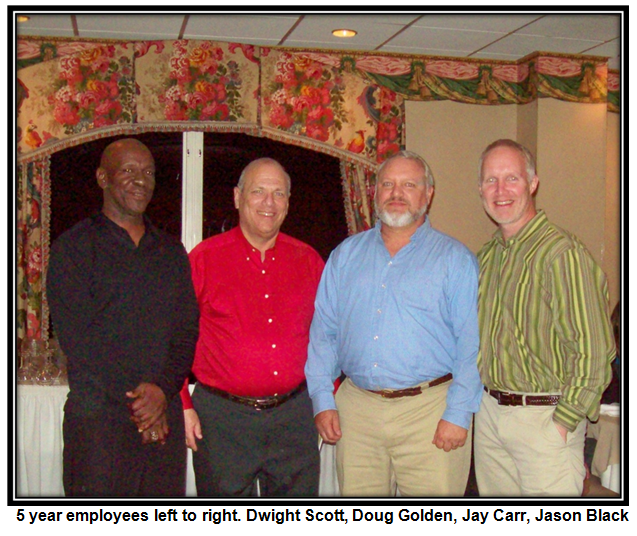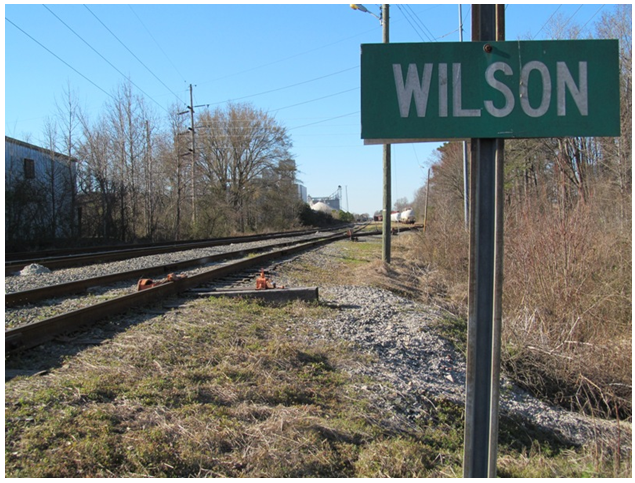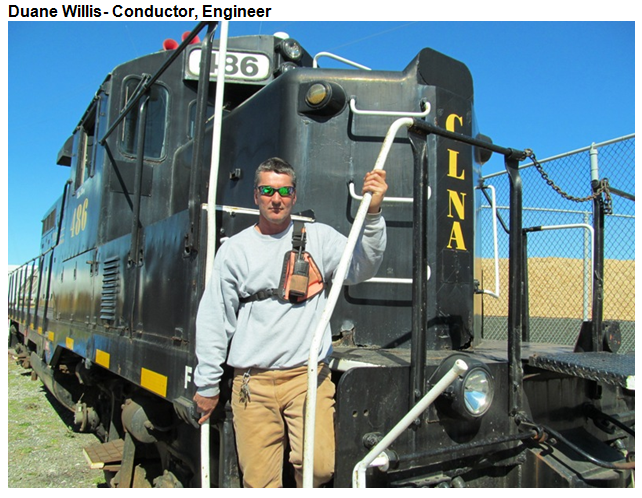
NEWSLETTER
CLNA NEWS – February, 2013
Editor – Kelly Bass
Quarterly Review
As 2012 drew to an end, CLNA kept close tabs on traffic counts. As it turns out, 2012 finished with record volume. We ended the year handling 11,454 loads, plus another 2,055 storage cars. Our total of more than 13,500 cars handled was about triple the volume we handled in 2008. For the main part of CLNA, 2013 has started off with good volumes as well. January was the second highest month we have had, while expected volumes in February would put it in the top five.
We had more than 60 people at our Christmas party. At that party, Dwight Scott, Jay Carr, and Jason Black were recognized for five years of service with CLNA. Thank you. We also welcomed new employees Mikel Plymon and Nick Coleman, and have since added Brian Mendell as well.


We have continued working on the railroad. Thousands of new ties have gone in on the main line between Bailey and Wilson and on the Plymouth Line, while the rail replacement projects on the Nash County Line continues towards its goal of replacing the entire 85# rail from Rocky Mount to the new auto shredder at RMR (which should come on line in March). These projects support traffic growth from the quarry at Neverson and off the Belhaven Branch, which had its best year in several years due to new outbound grain business from Perdue.
During 2013, we expect the auto shredder at Rocky Mount to come on line, as well as Pencco at Middlesex. We recently added a new fertilizer receiver, CA Perry, at Pantego, and finally expect construction to begin on the wood pellet plant at Sims. With the continued growth of the stone business as well, 2013 is shaping up to be another exciting year for CLNA.
Meet Our Customer
PCS Phosphate, Morehead City NC
PCS Phosphate is one of our customers located at the port in Morehead City. They bring a lot of business in for the port by unloading product from railcars to ships and also barges to ships for export. Phosphate is used in the processing and manufacturing of thousands of industrial goods, consumer goods and even food. The phosphate is processed at different levels to make several different forms of it. This gives PCS customers a product more suited to their needs of how they plan on using it. Carolina Coastal works with PCS’s Paul Rickman on how business is doing for the port facility. He told me that they loosely call it “Dry Product” and “Wet Product”. Under those titles are several categories dividing the product into further classes. Last year Mr. Rickman told me they did about 450 railcars of dry product and about 550 railcars of wet product. He also explained how their business shipping out depends on another branch of PCS that deals with mining. When the mining slows down bringing the raw product out, the exporting slows down at the port. December of last year was a very slow month and the first part of this year has seemed to carry the same weight so far. Mr. Rickman went on to tell me that he is expecting business to really pick up in the next couple months to put them back on track for last years numbers if not surpass them. They also have plans for some upgrades to equipment for better and more efficient unloading giving him more reason to believe business is going to be picking up soon. As far as safety, Mr. Rickman was proud to tell me they have had no lost time injuries in going on 13 years now with his department. Carolina Coastal also does business for PCS on the CLNA mainline by storing loads and empties to be released as needed. The Nash County Line also receives empty PCS cars from interchange in Rocky Mount holding them until enough are gathered to make a unit train to return back to their facility. I would have taken a couple pictures to show the work PCS is doing at the port, but the NC Ports Authority frowns upon taking photos of its facilities. Trust me though, it’s there and ready for business to pick up and get this year going; and so are we.
Along the Rails
Wilson, NC

Wilson, NC is Carolina Coastal Railway’s main point of operations. Wilson houses our shop for the locomotives that run the Raleigh to Plymouth mainline, car repair, track maintenance, and location where most train crews report for duty to begin work. In the late 1840’s after completion of the Wilmington-Weldon Railroad, Wilson was incorporated by merging the smaller communities of Toisnot Station and Hickory Grove and began to grow around the railroad. Growth was slow in the beginnings because of poor roads and no major rivers for boats to travel but the building of the railroad helped to fix those problems. Now having dependable connections to the port in Wilmington down south and Petersburg up north, agriculture products begin to flourish with these new markets. The completion of the plank road from Wilson to Greenville in the early to mid 50’s also helped it grow in the market and became a transportation center for new settlers coming and going. Today the plank road is roughly followed by US 264. This movement of people helped to establish a large carriage and wagon manufacturing company that sold products in North Carolina, South Carolina and Virginia. Wilson also came to be one of the largest cotton markets around until lower cotton prices and soil depletion slowly gave way to tobacco. Tobacco became a big boom for the town making it one of the largest markets in the nation and also gave a huge boost to a growing city that included buildings, construction, and workers. This flux in building is evident in Wilson’s Historical District that has a little over 360 properties included dating back to this time period. In the early 1900’s the Raleigh and Pamlico Sound Railroad added a better way of travel east and west. The plank road had deteriorated to the point of abandonment at this time so the new rail line gave Wilson another boost in its economy with passenger service to Greenville and to Raleigh along with the additional freight service. Today Amtrak provides service in Wilson to points north and south working on the CSXT mainline, former Wilmington-Weldon Line. While the Carolina Coastal serves customers on the old Norfolk Southern line, former Raleigh and Pamlico Sound line, heading east to Chocowinity and west to Raleigh. The CLNA serves Alliance One, Carolina Forge, Bruce Foods, J&J Commodities, Crop Production Services, Home Builders Supply, Garris Evans Lumber, and Paxton Warehouse all located in Wilson. We also have trans-load customers in Wilson that include Amerigas, Construct Inc., and Sun West Energy.

Carolina Coastal connects with CSXT for interchange at one of two connection points, the other connection being located in Greenville NC. Carolina Coastal has added a few customers since operations started in Wilson and has helped to grow existing customers. Our goal is to continue to work on building relationships to bring business to the area and support customers already online to give the best service possible to help with future growth.
Meet Our Employees

Duane Willis is one of our Conductor/Engineers down at the Port Operations in Morehead City. He has been with us since we started the switching operations at the port in 2010. Mr. Willis started working with Carolina Rail Service at The Port in 1998. When switching was split at the port by two different companies, he worked with the Beauford and Morehead Company which was based across the waterway on what is called Radio Island. He told me he still came across the bridge to switch customers, but was just under a different company name until they merged back into the Carolina Rail Service. Then he fell under the Gulf and Ohio name and now with CLNA. Before working with the railroad, Mr. Willis told me he did a little construction in the local area. He also told me of how business would grow at the port, fall off, and then grow back again. Last year was one of those times where business was able to grow despite the economy, but has fallen off for the first part of this year. Morehead is a switching facility that requires frequent work and cooperation with customers to move cars around for spot and re-spot. Some of our customer’s product comes in on ships that get loaded directly to railcars that need to be pulled and weighed for outbound movement. Other customers receive cars in unit cuts that need to be spotted, unloaded onto a waiting ship and then spot another cut quickly to avoid delay of the ship. When times are busy, they are on the go all day with little down time. When times are slow, they have time to tweak minor issues with engines and do some light rail maintenance.
Mr. Willis and his wife of 14 years, Angela, have two girls. He told me she is “hard working, a great mother to their girls, a great wife and wouldn’t change her for nothing.” He went on to tell me his girls, Samantha and Rebekka, are “the most wonderful kids”. They do great in school and are involved in a lot of sports. He told me to make sure to mention that Rebekka was a Christmas baby while Samantha was born on July 7th; both of them have a holiday to celebrate with. Duane and Angela spend a lot of there time going to school sporting functions and push the girls hard in basketball. He said they practice a lot on fundamentals and improving their game. His hopes are to get a scholarship for them after high school to go on to college. They love the game, and Mr. Willis tells me as long as they have that hunger to do better and succeed, he will do everything he can to help them. When not attending games or practice, Duane loves fishing, boating and pretty much any activity that gets him near the water. He also loves playing golf and does very good at the CLNA golf tournament held during our July 4th family picnic function.
Mr. Willis told me he loves working for the railroad and also added that he loves the job and the people he works with. He told me he wants to retire with Carolina Coastal and will go anywhere the company wants him to go when needed. When I asked what he would like to see in the next few years with the railroad, he told me he wanted to see business grow. Not just at the port, but across the CLNA system.